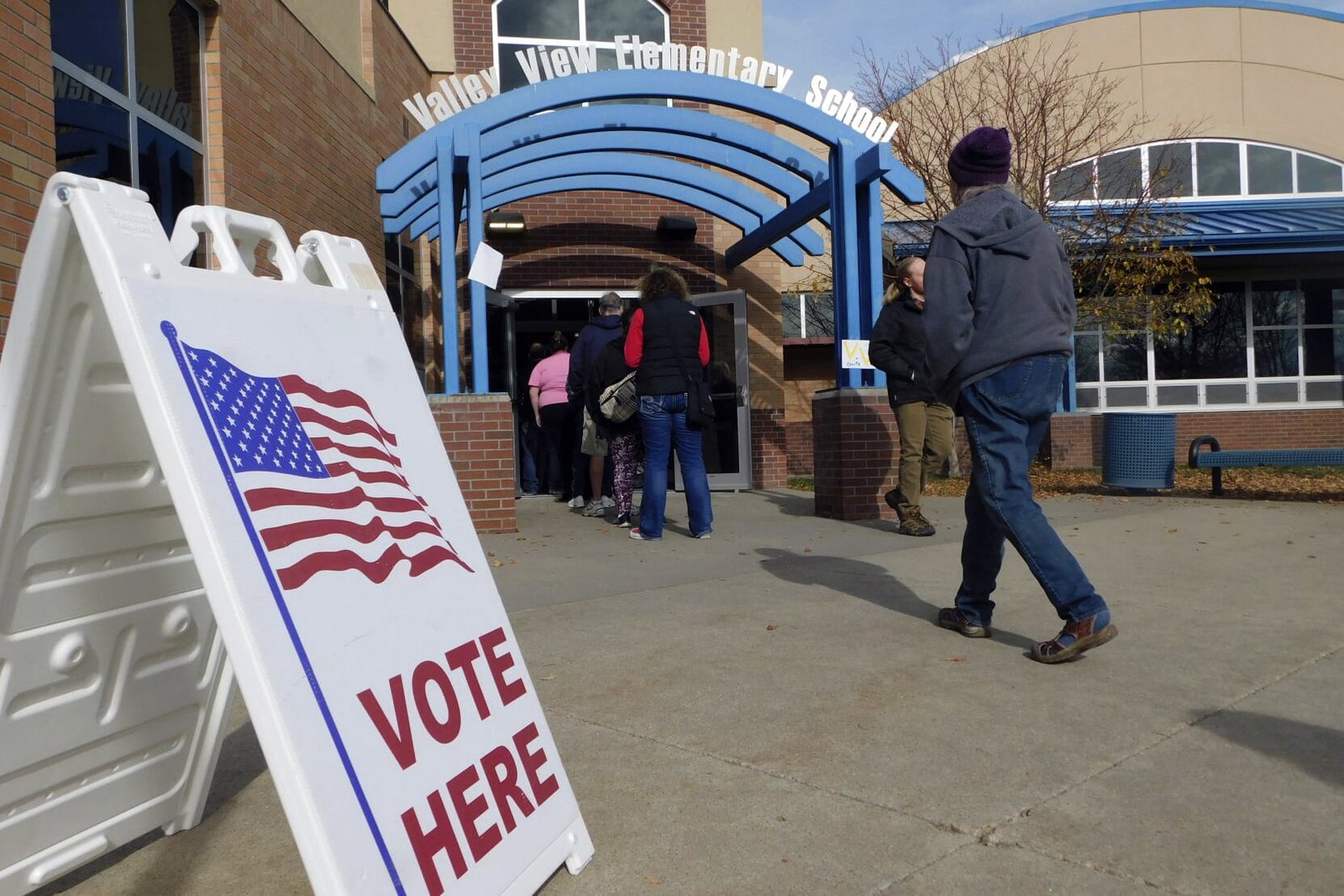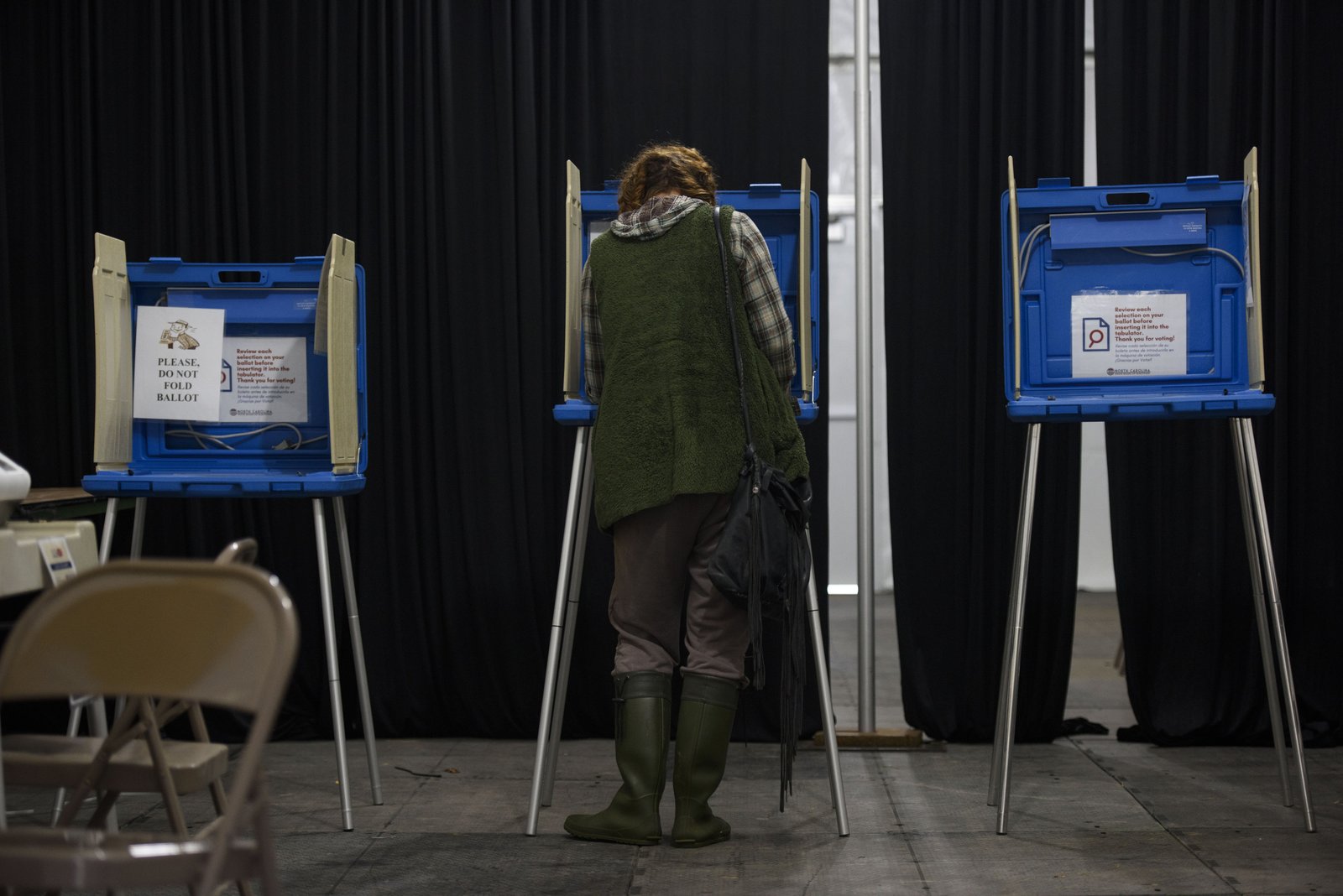Several key states and districts are gearing up for competitive congressional, state, and local races in 2025, despite the majority of the United States scheduling primary and general elections in even-numbered years.
Why Do Elections in 2025 Matter?
Donald Trump will be inaugurated as president for the second time on Jan. 20, 2025. During his election campaign Trump made a number of dramatic promises, including pledges that he would “end inflation,” pay off “a tremendous amount” of the U.S. national debt and end the Russia-Ukraine war if he was returned to the White House.

Pennigton County voters head to the polls at Valley View Elementary School Gym on Election Day, on Nov. 5, 2024, in Rapid City, S.D.
Madison Willis/Rapid City Journal/AP
Following his comprehensive election victory of Nov. 5, in which he picked up 312 Electoral College votes against 226 for Democrat Kamala Harris, Trump will be under pressure to show he can deliver on these promises.
Upcoming Elections in 2025
January
On Jan. 7, Virginia will hold special elections to fill two vacant legislative seats—State Senate District 7 and House District 26. These vacancies, created after their previous occupants were elected to Congress, have drawn national attention from Democratic strategists.
February
Wisconsin voters will head to the polls on Feb. 18 for primary elections to decide key races, including a seat on the state Supreme Court and the position of Superintendent of Public Instruction.

A woman fills out her ballot in a temporary FEMA tent placed in front of the Bee Log Elementary School on Nov. 5, 2024 in Burnsville, North Carolina. In 2025, Americans in a number of states will travel to the polls for several different key elections.
Melissa Sue Gerrits/Getty Images/Getty Images
April
Florida will hold two special elections for U.S. House seats on April 1. The 1st District, a Republican stronghold, became vacant after former Rep. Matt Gaetz, initially nominated as attorney general by President-elect Donald Trump, withdrew from consideration. Meanwhile, the 6th District opened following the resignation of former Rep. Mike Waltz, who was tapped by Trump to serve as national security adviser.
On April 1, Wisconsin voters will cast ballots in general elections for two pivotal positions: a seat on the state Supreme Court and the office of Superintendent of Public Instruction.
May
Pennsylvania voters will be casting their ballots on May 20 for primary elections, which include races for seats on the state Supreme Court and Superior Court, as well as the mayoral race in Pittsburgh and various municipal contests in Philadelphia.
June
New Jersey will hold its primary elections on June 3, featuring key contests for both gubernatorial and legislative seats.
On June 17, Virginia voters will decide primary races for several top positions, including governor, lieutenant governor, attorney general, and seats in the House of Delegates.
New York City will hold primaries on June 24, featuring the highly anticipated mayoral race alongside contests for other key municipal offices.
How Do Americans Feel About the Future?
A majority of Americans are generally apprehensive about 2025, with 56 percent expecting the country to experience “economic difficulty,” and 76 percent forecasting “political conflict,” according to a survey from Gallup last month.
Only 44 percent of Americans’ believe 2025 will be “a year of economic prosperity,” compared to 56 percent who expect “a year of economic difficulty,” according to the survey.
Just 23 percent of Americans expect a “year of political cooperation,” against 76 percent who anticipate more conflict, while only 32 percent expect “a peaceful year, more or less free of international disputes,” and 67 percent forecast “a troubled year with much international discord.”
On several other key issues, Americans are more evenly divided, with 52 percent expecting 2025 to be “a year of rising crime rates” against 48 percent who think they will fall. Americans are split 50/50 on whether 2025 will see taxes rise or fall, while 52 percent believe the year will see the U.S. “increase its power in the world,” against 48 percent who expect this to decline.
This article includes reporting from The Associated Press







